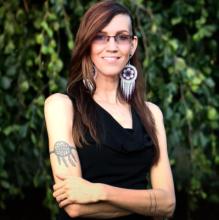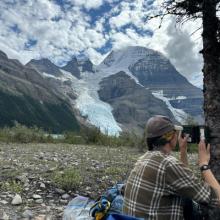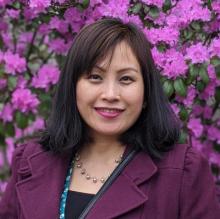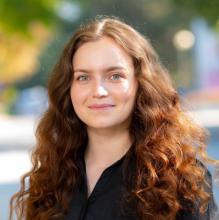PSI Scholar and doctoral student Dacotah-Victoria’s research considers humans’ relations and connections – to water and lived-experiences of water (in)security. Engaging in knowledge co-creation and creative arts-based approaches of storytelling, theatre and film, this partner-led research in Canada and New Zealand explores the social dimensions of water beyond measurements of quality and quantity – culture, values, identity… and their inclusion to mobilize and encourage varied conversations and responses to water (in)security.
Research Description
At a time of increasing awareness of the importance of global freshwater resources, people’s experiences of uncertainty of the availability of water of has come to the forefront. Will we run out of water? If so, when? And if we do, what are the direct and indirect impacts of this change on individuals, communities and nations? Water security centres on the capacity of society to safeguard access to adequate water supplies - both the quantity and quality of water for domestic and productive purposes, while ensuring the preservation of ecosystems. Flowing from such definitions, policy and research on water (in)security often fails to consider ways that water is inherently cultural, social and political with significant implications for how we frame and aim to address freshwater challenges. Water security, necessarily, is underpinned by normative assumptions, specific worldviews and value systems that may differ with values held by particular individuals and groups, notably those who have not been included in shaping water narratives and policies. These concerns point to the need to attend to the value systems of diverse stakeholders and to encourage more fulsome, inclusive, and meaningful engagement in water governance challenges, especially in rural and Indigenous communities. With this in mind, this research explores how utilizing knowledge co-creation and creative arts-based methodologies could mobilize and encourage different kinds of conversations and responses to water (in)security. In so doing, we can engage broader communities to influence water governance across scales.
My Public Scholars Initiative project responds to this dilemma through a collaborative community engagement project called “Examining the Museum of Rain Theatre project: Exploring narratives of water (in)security in British Columbia.” The project involves collaboration with the Vancouver based-theatre production company, The Only Animal, to illuminate diverse experiences of water (in)security and relationships with water. Working with this theatre company, this project incorporates the real-lived narratives of British Columbia residents into a public play to be produced over the coming two years. As such, this represents a unique opportunity to both solicit and share, narratives of water (in)security in ways that will be very different from traditional research practices. Working together with the theatre process, this collaborative work will bring to life the narrative data, and the research will directly explore how these interactions and modes of sharing might encourage novel conversations and responses to water (in)security in the province.
What does being a Public Scholar mean to you?
Working globally as a water researcher and storyteller, it’s both serendipitous and wonderful honour to join the Public Scholar collective where I am offered continuous support in my research journey towards exploring creative methodologies within my water work, coupled with a passion for working directly with communities. My commitment to service compliments my role as a Public Scholar where I aim to enhance communication between individuals and groups and engage them in reflecting on their situations to better understand how to challenge structural inequalities and express their needs in creative ways. Engagement is central to my work and in the spirit of co-learning and great humility, I am thrilled to exercise artistic and creative expression that can, in turn, enliven our empathy with others and build relations of solidarity beyond the academy.
In what ways do you think the PhD experience can be re-imagined with the Public Scholars Initiative?
As my dissertation work is partner-led and community-based, the Public Scholars Initiative affords me the opportunity to gain further experience in this research approach and the project itself can lead as a dynamic and tangible example for other scholars whom may consider the application of arts-based research and collaborations with communities and artists in their own work and initiatives. I am grateful for the PSI community. My PSI peers are the most engaged human beings that I have ever met! With every conversation shared, I come away inspired to re-imagine my work with greater sense of what is possible, while affirming my purpose.
How do you envision connecting your PhD work with broader career possibilities?
A connector, ally and a big fan of water’s transformative capacity to function as bridge for communities in arenas beyond water, such as human rights, environmental justice and the empowerment of women as a few examples, I view my doctorate program and continued scholarly experiences with the mindset to be useful, to serve my greater community and the public good, and make a real-world impact not only following my doctoral degree, but presently throughout my studies. Developing my skillsets in innovative community participatory and arts-based methodological approaches, I seek to engage with and learn from my research partners and the public in a community-centered relation, one established on honesty, trust, respect, deep listening and reciprocity. My ultimate hope and vision would be for the pursuit of my doctoral degree – a collective shared-experience, one where I bring everyone along with me – my family, communities and research partners, to lend itself towards capacity building and promoting prospects for future professional collaborations.
How does your research engage with the larger community and social partners?
By way of engaging arts to incorporate elements of research and creating novel opportunities for public outreach, my research strongly responds to the urgent need to present the issue of water (in)security from the lived experiences of local residents expressed through their narratives of water in order to generate a broader discourse towards informing individual water use and policy actions to address water (in)security across cultures, geographies and scales - locally, regionally and nationally. This research approach offers the potential to demonstrate the importance of academic knowledge and the innovative and valuable translations available of this knowledge to make scholarly work more widely accessible to the various stakeholders.
Why did you decide to pursue a graduate degree?
Working as a peace researcher at the Kroc Institute for Peace & Justice, while simultaneously surfing the salty waves in San Diego in 2013, my ah-hah moment arrived – the discovery that water is the one thing on this planet that we all share in common. We all need water to live. This concept may seem obvious to many, but I began thinking deeply on the inherent connection we hold with water, and I thought, “What if I were to work on a team with water?” By nature, I am connector. My passions are people, resources and linking the two – especially connecting individuals and groups to resources that may be more difficult to access. Could working with water be the ultimate bridge towards cultivating novel connections and understandings with people and communities across scales? Inspired by this notion, I dove in deep and have not ceased in my explorations of our human connections and relations to water.
Professionally, I have been beyond fortunate to travel river basins, globally. Working as a journalist, researcher, scientist, and mediator, my water work has carried me to Ireland, Spain, Australia, Costa Rica, Panama, Nicaragua, Argentina, United States, and all the way to South Africa. Through listening, sitting and engaging and learning with and from communities and their waterways, what stood out most during this shared water journey is the elucidation of every individual’s and communities’ more-than-water-as-a-resource value(s) and meaning(s) held for water – the significance of what their water means to them in their daily lives. Dually, without water, the impacts this poses on culture, identity and connection to place. Partnering with water and communities encouraged me to continue these engagements and collaborations within the academy.
Why did you choose to come to British Columbia and study at UBC?
I selected UBC to pursue my doctoral work given the alignment of my interests with the mission of my program at The Institute for Resources, Environment, and Sustainability: to foster sustainable futures through integrated, collaborative and applied research concerning the connections between humans and the environment, and to support decision-making from local to global scales. Working as an interdisciplinary researcher, for the first time in my academic career I feel sense of profound ease since my arrival at UBC. It is a given that I do that kind of work I do – collaborative, partnered and creative. To feel accepted, included, and supported in this way while I carry out this important work, I acknowledge this experience as a rarity and a privilege within the greater academic sphere. I am incredibly inspired towards the contributions that I can bring to my chosen academic home by embracing its mission fully by engaging in collaborative, practical and impactful research through advancing the water security scholarship, arts-based engagement and by promoting a knowledge exchange between water-stressed communities, regional governmental and non-governmental organizations, and notable sustainability research organizations, including IRES and the University of British Columbia.
My commitment to service compliments my role as a Public Scholar where I aim to enhance communication between individuals and groups, and engage them in reflecting on their situations to better understand how to challenge structural inequalities and express their needs in creative ways.




